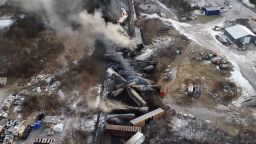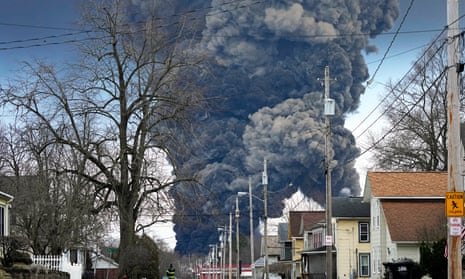By Dakin Andone, CNN
Sun February 19, 2023
US Sen. Sherrod Brown echoed officials’ beliefs Sunday that the water and air are safe in East Palestine, Ohio, after a train carrying hazardous materials derailed there earlier this month, but he acknowledged that residents are “right to be skeptical.”
“We think the water’s safe,” the senator, a Democrat, told CNN’s “State of the Union,” days after he visited the community, citing comments made by the administrators of the state and federal Environmental Protection Agencies. “But when you return to your home, you should be tested again for your water and your soil and your air, not to mention those that have their own wells.”
The senator’s comments come 16 days after the Norfolk Southern train derailed in the small community of less than 5,000 people, where residents have described rashes, sore throats and nausea after returning home following controlled detonations of some of the tanks that were carrying toxic chemicals, including vinyl chloride, which has the potential to kill at high levels and increase cancer risk.
An evacuation order was lifted five days after the derailment, when officials deemed the air and water safe. But many residents remain unconvinced, complaining about the lingering smell of chemicals, headaches and pain.

Norfolk Southern CEO again promised to do right by East Palestine residents. The community wants to 'hold him to that'
Anger and frustration continued to boil over this week, as residents demanded answers of officials and Norfolk Southern. Hundreds of residents attended a town hall, expressing concern about air and water safety and their mounting distrust of civil leaders.
“Why are people getting sick if there’s nothing in the air or in the water,” one resident yelled during the town hall.
The Ohio Department of Health announced it is opening a health clinic geared at providing medical care and assistance relating to the recent train derailment starting Tuesday at noon, according to a statement from the agency.
“I heard you, the state heard you, and now the Ohio Department of Health and many of our partner agencies are providing this clinic, where people can come and discuss these vital issues with medical providers,” said the department’s director Dr. Bruce Vanderhoff.
The clinic will be located at the First Church of Christ on 20 W. Martin St in East Palestine and will include two assessment rooms. A mobile unit operated by the Community Action Agency of Columbiana County will also be on site to allow for more appointments. Registered nurses, mental healthcare specialists as well as a toxicologist will be made available to community members seeking their assistance.
Officials have sought to reassure residents, acknowledging that while some waterways were contaminated, killing thousands of fish downstream, they believe those contaminants to be contained. No vinyl chloride has been detected in any down-gradient waterways near the train derailment, Tiffani Kavalec, the Ohio Environmental Protection Agency’s division chief of surface water, told CNN earlier this week.
And state officials have repeatedly determined water from the municipal system – which is pulled from five deep wells covered by solid steel casing – is safe to drink, though the state EPA has encouraged those who use private wells to get that water tested, since they may be closer to the surface.
The CEO of Norfolk Southern – which pulled out of the town hall this week, citing safety concerns – met with residents and local leaders Saturday, promising in an open letter that “we are here and will stay here for as long as it takes to ensure your safety and to help East Palestine recover and thrive.”
After visiting the community Thursday, Brown pledged to hold the rail company accountable for the impacts on the community, saying in a news conference he would “make sure Norfolk Southern does what it says it’s going to do, what it’s promised.”
Brown reiterated that Sunday. The company has promised to provide a $1,000 payment to residents within the zip code, but the senator said it would need to go far beyond that and live up to its commitment to “making everybody whole.”

Opinion: 'Everyone's scared' -- a novelist's view of the rail disaster in Ohio
“Whatever (residents) need, everything that’s happened here – all the cleanup, all the drilling, all the testing, all the hotel stays, all of that is on Norfolk Southern. They caused it, there’s no question they caused it,” Brown said, adding the total cost could amount to either tens or hundreds of millions of dollars.
The company has also started a $1 million fund “as a down payment on our commitment to help rebuild,” Alan Shaw, Norfolk Southern’s CEO, said in his open letter Saturday. It has also “implemented a comprehensive testing program to ensure the safety of East Palestine’s water, air, and soil.”
In addition to local and state officials, federal medical experts have also been deployed.
Ohio Gov. Mike DeWine Thursday asked the US Centers for Diseases Control and Prevention and the US Department of Health to send teams. In response, the Biden administration said it deployed experts to help assess what dangers remain, and the CDC similarly confirmed Friday it would send a team to assess public health needs.
As for the derailment itself, the National Transportation Safety Board continues to work “vigorously” to determine its cause. Investigators are reviewing multiple videos of the train prior to its derailment, including one that shows “what appears to be a wheel bearing in the final stage of overheat failure moments before the derailment,” the agency has said.
Mom who fled with baby after toxic derailment wants officials to 'drink the water' in Ohio town
Evacuation order lifted, but couple with newborn not ready to return
A couple with an infant son who fled their home after a toxic train derailment in Ohio earlier this month are not convinced it's safe to return home, despite what state officials have said.
The Feb. 3 derailment prompted officials to evacuate hundreds of people from their homes in the town of East Palestine amid fears that a hazardous, highly flammable material might ignite.
To prevent toxic vinyl chloride gas — used in the production of PVC plastic — from exploding, officials carried out a controlled release of the fumes. The gas was vented and burned after being diverted to a trench, sending a plume of smoke over the town for days.
East Palestine residents Kasie and Nathaniel Locke remember the night of the derailment, with Kasie telling CBC News they've been "stuck in limbo" ever since, staying with her mother in North Lima, about a 16-minute drive from the site.
Dozens of cars of the Pennsylvania-bound freight train derailed shortly before 9 p.m. on a Friday, and the young family left home around 2 a.m. the next day.
It smelled like "really intense" burning rubber and oil and they "couldn't breathe," said Nathaniel.
"We both had to wrap our faces in receiving blankets from Lucas."
They said they experienced headaches, runny noses, and burning and numb eyes and throats.
Kasie said it's been "anxiety-inducing" thinking about the health of her child.
"It's very scary. I mean, we don't feel safe going back ... not with a two-month-old," she said. "Consciously, I can't do it. I don't know what effects it will have on his health."
She said baby Lucas has since been taken to Akron Children's Hospital to get his nose suctioned out, and they've used saline and a nasal aspirator to manage his congestion, adding that she's not sure if he's sick or if the symptoms are related to the derailment.
Evacuation orders were lifted Feb. 8, when Ohio Gov. Mike DeWine and other officials said it was safe for the residents of the community to return home.
State testing of municipal drinking water
DeWine on Friday said a plume of pollution that had been moving down the Ohio River had dissipated, and said state testing never showed that any contaminated water entered any municipal drinking systems in its path.
In response to the derailment and safety concerns it raises, U.S. Senate commerce committee chair Maria Cantwell late on Friday said she has opened an inquiry into railroad hazardous materials safety practices.

The head of the U.S. Environmental Protection Agency got a first-hand look Thursday at the toll left by the derailment.
EPA Administrator Michael Regan said Thursday that anyone who is fearful of being in their home should seek testing from the government.
"People have been unnerved. They've been asked to leave their homes," he said, adding that if he lived there, he would be willing to move his family back into the area as long as the testing shows it's safe.
The Ohio EPA said the latest tests show five wells supplying the town's drinking water are free from contaminants.

U.S. Transportation Secretary Pete Buttigieg said Sunday he will call on major railroads to improve safety in light of the derailment.
Writing to railroad executive Alan Shaw — whose company, Norfolk Southern, operated the derailed train — Buttigieg added that he would call on Congress to raise the cap on fines against railroads for violating safety regulations.
Norfolk Southern said Sunday that it "received a copy of the letter from the secretary and are reviewing." Shaw said last week the railroad had established an initial $1 million US community support fund and distributed $1.7 million US in direct financial assistance to more than 1,100 families and businesses to cover evacuation costs.
"We will not let you down," he told residents in a letter.
'Would they bring their family back?'
Kasie Locke has a challenge for officials who believe the town of 4,700 is a safe place to live.
"I would like them to come stay in East Palestine and drink the water, shower with the water. I'd like to hear them tell us, would they like to live here? Would they bring their children here? Would they bring their family back? Because it would be hard for me to believe they would say yes."

The U.S. Health and Human Services Department and the Centers for Disease Control and Prevention (CDC) said Friday they were deploying a team of medical personnel and toxicologists to conduct public health testing and assessments.
Federal Railroad Administration chief Amit Bose will visit the site next week and the Environmental Protection Agency is stepping up testing.
With files from Reuters
A train derailed and flooded a town with cancer-causing chemicals. But something larger, and more troubling, is at work

Sat 18 Feb 2023
Earlier this month, a train carrying toxic chemicals derailed in eastern Ohio, exploding into flames and unleashing a spume of chemical smoke on the small town of East Palestine. The train’s freight included vinyl chloride, a chemical known to cause liver cancer and other sicknesses.
In response, government and railway officials decided to “burn off” the vinyl chloride – effectively dumping 1.1m lbs of the chemical into the local community, according to a new lawsuit. Officials said that they did so to avert the vinyl chloride from exploding; in contrast, an attorney for the lawsuit has said that the decision was cheap, unsafe, and more interested in restoring train service and appeasing railway shareholders than protecting local residents.
East Palestine residents are reporting headaches, sore throats, and burning eyes; dead pets and chickens; and thousands of fish corpses in nearby waterways. The Ohio Department of Natural Resources has said that approximately 3,500 fish, of 12 different species, died across 7.5 miles.
In other words, Norfolk Southern’s “controlled burn” may have caused a mushroom cloud of poison to spread over eastern Ohio. The situation demands immediate action from President Biden. Without it, thousands of people – including children and the elderly – and animals will be at continued risk of premature death. Biden must declare a state of emergency and create an independent taskforce to take over the remediation of this eco-catastrophe.
Norfolk Southern “basically nuked a town with chemicals” to “get a railroad open”, a former hazmat technician told a local news outlet. It certainly seems like a company with a $55bn market cap chose to sacrifice the health of thousands of people to keep its profits flowing.
We need to try to understand how this happened.
For one thing, even the initial derailment wasn’t necessarily just an “accident.” It was a function of our out-of-control corporate culture in the United States, which has neutered effective government oversight of hazardous activities – including the rail transport of highly flammable and carcinogenic chemicals. The EPA’s response thus far has been to send a feckless letter to Norfolk Southern pleading it pay for clean-up.
That’s not going to cut it. We need to do better.
In terms of the sheer quantity of carcinogenic chemicals being released over an area of hundreds of miles, the catastrophe in Ohio is a major, unprecedented public health crisis. Biden must publicly recognize it as such and act to protect the people who live in the affected area. This requires a rapid, all-of-government response overseen not by the EPA but by independent scientists and taskmasters who will be immune to pressure from industry. This sort of taskforce must be willing to threaten the suspension or even nationalization of Norfolk Southern if it does not cooperate.
After battling an oil company over the discharge of toxic waste in the Amazon, I can say with some assurance that Norfolk’s response to this crisis so far comes from a time-tested corporate strategy: manage the situation as a public relations challenge and not the humanitarian and ecological catastrophe that it is. Norfolk’s leadership bailed out of a townhall meeting this week, blaming security risks, and has refused to face residents to answer questions.
That’s certainly cowardice. But it is also a function of the fact that industry does not respect the power of government to regulate it. Government is supposed to protect us from the excesses of industry; instead it often acts like its partner.
If the consequences of not attending had included a sufficient threat to his bottom line, Norfolk Southern CEO Alan Shaw – who earns a reported $4.5m a year – probably would have been at the town hall. And if the government had been doing its job in the first place, there is a good chance this accident would not have happened. During the Trump administration, Norfolk successfully lobbied to repeal a safety rule requiring new electronic brakes. The train was also dangerously long – with only two crew members, and a trainee, supervising its 1.7-mile length.
I’m not a scientist. But I know a fair amount about toxicology and how the world’s polluters use a playbook invented by law firms and consultants to downplay the impact of major disasters and lower their legal liability. Local and state officials – who may be under enormous pressure from these industries in the form of campaign donations – often work alongside polluters to “manage” disasters’ political fallout.
It’s a one-two punch of disaster mismanagement that is playing out now, in Ohio, with awful consequences for people and the planet. Here are three takeaways about what is really happening and what needs to be done:
Be skeptical of claims by authorities that it is “safe” to return to the area. The EPA and state environmental officials have been opaque about what chemicals are being tested for and by what methods, and news reports haven’t indicated any plans so far for any sort of environmental restoration. We also do not know what new chemical compounds the so-called “controlled” burn may have created, and whether tests have been run for those chemicals. In fact, test results have not even been released publicly.
Bottom line: there is no transparent scientific or public health basis for declaring the area safe. Until there is, I wouldn’t go near the site of the disaster.
The EPA can help, but cannot oversee a clean-up. Corporate lobbying in recent years has undermined the ability of the EPA to regulate industry. Under the Trump administration, chemical lobbyists took over important jobs on the inside and the agency is severely understaffed. Further, the EPA is required by Congress to “balance” industry needs with public safety. It is not focused solely on protecting the community. It sent a letter to Norfolk pleading with it to pay for a cleanup; a real government would have sent a disaster management team to Ohio to take over.
Longer-term, the railway industry needs to be revamped. We have civil-war era braking systems on trains carrying deadly chemicals though our communities. Railway unions and whistleblowers have repeatedly raised safety concerns only to be ignored. A new industry concept called “precision scheduling” has pushed trains and workers to the breaking point to extract greater profits for shareholders, which include some of the largest hedge funds on Wall Street.
Our government institutions as currently constituted are unable or unwilling to respond effectively to industrial disasters. It is preposterous for any ostensibly advanced country to let a massive chemical polluter clean up a mess like this on its own terms and without effective oversight. This is not an isolated incident. Unless we demand accountability, it will happen again.
President Biden: the ball is in your court.
Steven Donziger is a human rights and environmental lawyer, a Guardian US columnist, and the creator of the Substack newsletter Donziger on Justice

No comments:
Post a Comment